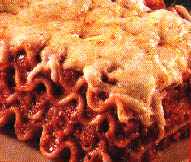|
|
Homemade
Lasagna
Ingredients:
1 mixture Homemade
Pasta for Lasagna
1 mixture White
Sauce for Lasagna
1 mixture Tomato
or Ragu Sauce for Lasagna
2
cups grated Mozzarella cheese
Preparation:
- Fill large
pot with water, add 1 tablespoon salt into water and bring to boil.
- Cook prepared homemade pasta
squares only for 1-2 minutes,
lift each piece out and pass it through the bowl of cold water and
transfer
it to the clean cotton cloth. Use cold water, because only cold water
prevent
pasta pieces from sticking, (change water in the bowl if needed).
- Use your large gratin dish and
spread
a generous layer of the white sauce over the base. Lay a single layer
of pasta over it and spread with a generous layer of tomato sauce, than
another layer of pasta, white sauce and few tablespoons of grated
cheese. Repeat layers, and finish with
white sauce
on top with grated cheese.
- Preheat oven to 375º F
(190º C).
- Before baking, put a few flakes
of butter on the top.
- Bake your lasagna for 30 to 35
minutes or until the
top is brown and bubbling. Serve with salad and with good Italian red
wine.
Makes 8 servings.
NOTE: To make
Homemade Canelloni, roll
the squares of cooked pasta for lasagna around
a heaping tablespoon
of ragu. Pack the rolls into an oiled gratin dish, cover with the white
sauce, sprinkle with grated parmesan and bake as for the lasagna.
TIP:
You can make the lasagna using layers of
prepared dry
pasta from store. If you using that kind of pasta follow the
instructions
on the box.
Related Links:
|
|
 |
Did You Know?
|
In
the 1st century BC writings of Horace, lagana were fine sheets of dough
which were fried and were an everyday food.
Writing in the 2nd century Athenaeus of Naucratis provides a recipe for
lagana which he attributes to the 1st century Chrysippus of Tyana:
sheets of dough made of wheat flour and the juice of crushed lettuce,
then flavored with spices and deep-fried in oil.
An early 5th century cookbook describes a dish called lagana that
consisted of layers of dough with meat stuffing, a possible ancestor of
modern-day Lasagna. But the method of cooking these sheets of dough
does not correspond to our modern definition of either a fresh or dry
pasta product.
The name lagána survives in modern-day Greece to denote an
unleavened, flat bread eaten during the Great Lent.The term "lagana" is
also used in the Southern region of Calabria, where it indicates a flat
noodle.
|
|